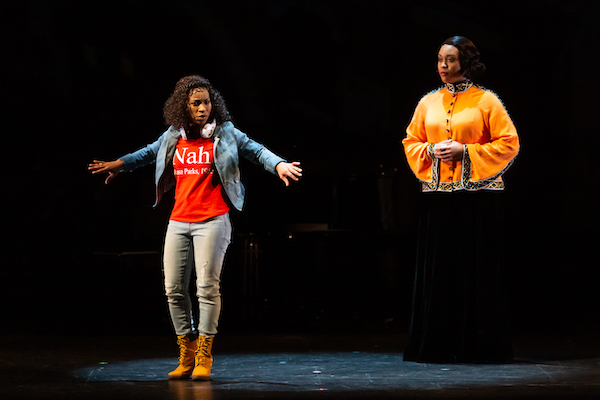Strong libretto, uneven music make “Marian’s Song” a mixed tribute to an opera pioneer

The racial barriers of mid-1900s America blocked Marian Anderson from U.S. opera houses for nearly her entire career. But Houston Grand Opera returns the iconic contralto to center stage in Marian’s Song, a chamber opera that had its world premiere Thursday in the Wortham Theater Center’s Cullen Theater.
HGO commissioned it from Damien Sneed, a composer and conductor who straddles classical and popular music, and librettist Deborah D.E.E.P. Mouton, a former Houston poet laureate who founded a performance-poetry group, Houston VIP Slam Team.
Their hourlong work looks at Anderson, an African-American woman, through the eyes of a fictional present-day college student named Neveah, who is galvanized by her grandmother’s stories about Anderson’s life as an artistic and civil-rights trailblazer.
Flashbacks let the audience see Anderson sharing her art in concert and facing down discrimination offstage. But Sneed’s score falls short of the impact of Mouton’s text, so Marian’s Song never summons Anderson’s full humanity and stature.
Marian’s Song takes a novel path to conjuring up the two women’s worlds. A mezzo-soprano, Zoie Reams, portrays Anderson whereas Sneed and Mouton — drawing on the librettist’s experience in performance poetry — have cast spoken-word performer Tina B as Neveah, who expresses herself in flights of blank verse: “Marian/ Voice like a rumble/ Stoic like a ship’s mast/ That woman switched from spirituals to opera/ And still kept the Black intact.”
As the opera opens, Neveah learns that the Philadelphia church where the young Anderson sang in the choir is about to be demolished. She jumps on a train to make a pilgrimage there, hoping to beat the wrecking ball.
As Neveah rides, she reflects on the bronze-voiced singer’s experiences — from Anderson’s beginnings in Union Baptist Church through her collisions with racial roadblocks to her historic 1939 concert on the steps of Washington’s Lincoln Memorial. Neveah’s musings set up flashbacks to those long-ago events.
For all the concentration and power of Neveah’s poetic salvos, though, Sneed and Mouton haven’t figured out how to make their mixture of music and spoken word work in the theater.
As Neveah speaks, Sneed’s score continues uninterrupted. Her voice competes not only with the instrumental ensemble in the pit — nine musicians from the HGO Orchestra — but sometimes with the singing voices of Anderson or others.
On Thursday, Tina B was nearly inaudible during the first couple of scenes, during which her voice was unamplified.
After someone switched on a microphone, the words began to come across, and the vigor and animation Tina B injected into them helped capture Neveah’s fervor. But the verbiage raced along so rapidly that bits of it still were lost amid the competition from instruments and voices.
Mouton’s libretto also includes potent material for Anderson and other characters: “Have you ever had a want that makes you tremble so badly it must be right?” she sings to her pianist, Billy, who responds, “You’ve worked so hard the earth resounds.”
But Sneed’s music for that exchange lets those images slip past, never suggesting a tremble of desire or the shake of the resounding earth. The voices and instrumental group do at least create a swaying, rocking flow at the end of the scene, as Anderson and Billy imagine opportunities awaiting her across the ocean.
Sneed’s strength lies more in crafting music that lets the words in the dialogue and short soliloquies flow out simply and naturally. Along the way, he works in excerpts from works the real-life Anderson sang, from the spirituals “Crucifixion” and “No Hiding Place Down Here” to Schubert’s “Ave Maria” and Richard Strauss’ “Morgen.” Toward the end of “Morgen,” Sneed and Mouton splice in new words that reveal Anderson’s tinges of homesickness as she concertizes in Europe.
In those juicy excerpts as well as Sneed’s more self-effacing music, Reams as Anderson sang Thursday with a warmth, spirit and dignity that offered echoes of the revered artist’s qualities. Reams also carried herself with a dignity and smiling optimism that evoked Anderson’s quiet but unshakable resolve.
Bass-baritone Nicholas Newton’s rich, hearty voice and sympathetic manner lent Billy a dignity of his own. Soprano Cynthia Clayton and baritone Geoffrey Peterson fleshed out the story by taking an array of short roles — including an NAACP official played by Peterson and, for Clayton, no less than former first lady Eleanor Roosevelt.
The 12-member chorus chimed in with gusto in “No Hiding Place Down Here” and other key moments. Sneed’s score put the instrumental ensemble mainly in a background role, and the group — led by conductor Benjamin Manis — played with clarity and occasional dashes of impact.
Meanwhile, Dennis Whitehead Darling’s staging enabled the story’s moves through time and place to flow smoothly — often with the help of Driscoll Otto’s video projections, which helped conjure up concert halls, Anderson’s church and other settings. But without a compelling score at the foundation, Marian’s Song couldn’t give Anderson her due.